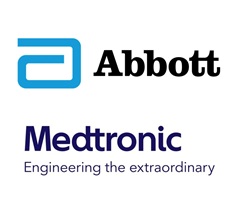 Among a great number of presentations relating to pulsed field ablation (PFA) treatments for atrial fibrillation (AF) at this year’s Heart Rhythm Society (HRS) annual meeting (24–27 April, San Diego, USA), industry leaders Abbott and Medtronic both announced the latest clinical data demonstrating positive outcomes with their own PFA systems.
Among a great number of presentations relating to pulsed field ablation (PFA) treatments for atrial fibrillation (AF) at this year’s Heart Rhythm Society (HRS) annual meeting (24–27 April, San Diego, USA), industry leaders Abbott and Medtronic both announced the latest clinical data demonstrating positive outcomes with their own PFA systems.
At HRS 2025, new data from Abbott’s Volt CE-mark study were showcased, as were findings on clinical outcomes from two studies evaluating Medtronic’s Affera family of ablation technologies.
New Volt CE-mark study data
Abbott’s announcement of new data from its Volt CE-mark study shows strong safety and efficacy out to 12 months for patients receiving PFA therapy with the Volt PFA system for the treatment of AF, according to the company. The data also highlight the excellent safety profile of the system alongside its ability to achieve results with fewer therapy applications—just 4.7 applications per vein, on average—versus on-market competitive PFA systems.
Abbott has designed its Volt CE-mark study to assess the impact of the Volt PFA system in two different patient groups—those with paroxysmal AF as well as those with persistent AF. Twelve-month data from the study were presented at HRS 2025 and simultaneously published in the journal Heart Rhythm.
Data from the Volt CE-mark study showed that, after 12 months, Abbott’s PFA system delivered the following outcomes:
- Outstanding long-term performance—the Volt PFA system demonstrated sustained performance in both safety and effectiveness out to 12 months for patients with paroxysmal and persistent AF
- Freedom from arrhythmia—83.5% of paroxysmal AF patients and 58.1% of persistent AF patients remained free from atrial arrhythmia after 12 months, which is claimed by Abbott to be one of the lowest rates of reoccurrence in paroxysmal AF patients within a long-term PFA study to date
- Quality of life (QoL) benefits—after 12 months, the Volt CE-mark study showed a significant QoL benefit for patients, with QoL assessment scores improving from 64.1 to 88.1
- Excellent safety profile—after 12 months, 2.7% of Volt patients had experienced a primary safety endpoint event with zero patients suffering from haemolysis, coronary artery spasm, pulmonary vein stenosis, acute kidney injury, or phrenic nerve injury, which are all potential challenges associated with PFA therapy
“The long-term 12-month results from the Volt CE-mark study paint a picture of a PFA system that performs exceptionally well in two different groups of patients—each with unique therapy needs and clinical approaches,” said Gian-Battista Chierchia (University of Brussels, Brussels, Belgium). “These long-term data provide us a strong picture of how the Volt PFA system will perform in clinical settings as we leverage PFA therapy for our patients.”
To date, clinical experience following CE-mark approval has further confirmed that the Volt PFA system can support the treatment of people battling either paroxysmal or persistent AF, allowing the system to help “as many patients as possible”, according to Abbott. The Volt PFA system also provides a single-catheter PFA approach, improves workflow and provides procedural flexibility by allowing for light sedation or general anaesthesia. A recent press release from Abbott notes that a new sub-analysis from the VOLT-AF investigational device exemption (IDE) study presented at HRS 2025 showed no significant difference in safety or acute effectiveness outcomes in cases performed under conscious or deep sedation when compared to procedures performed with general anaesthesia.
“Our goal from the beginning with the Volt PFA system was to design a PFA system that would provide outstanding results in patients battling a range of atrial arrhythmias, and the latest data from the Volt CE-mark study are confirmation that the system will truly impact patient care in a positive way,” said Christopher Piorkowski, chief medical officer of Abbott’s electrophysiology business.
Latest findings on Affera technology
Also at HRS 2025, Medtronic announced positive clinical outcomes from two studies in AF patients treated with the Affera family of technologies, including the next-generation Sphere-360 single-shot PFA catheter and the “groundbreaking” Sphere-9 combination mapping and dual-energy focal PFA catheter. Data were presented in high-impact science sessions at the HRS meeting, and the Sphere-360 study was simultaneously published in Heart Rhythm.
Sphere-360 is described by Medtronic as an investigational, first-of-its-kind, single-shot PFA mapping and ablation catheter for the treatment of paroxysmal AF. Results for Sphere-360 at one year—in a prospective, single-arm, multicentre trial performed in European centres—have demonstrated freedom from arrhythmia recurrence in 88% of patients, with chronically durable pulmonary vein isolation (PVI) in 98% of targeted veins and no reported safety events in a subgroup treated with the most optimised waveform.
Medtronic claims that the Sphere-360 catheter has a large, conformable lattice design that can be modified into various shapes, is seamlessly integrated with the Affera mapping and ablation system, and utilises an 8.5Fr sheath—”the smallest in any single-shot PFA technology”.
“The Affera technology is a sophisticated ecosystem, including an advanced, intuitive mapping system and catheters that are seamlessly integrated to offer treatment options for different cardiac arrhythmias. It is encouraging to see the promising results for Sphere-360, which can easily create circumferential lesions without the need for catheter rotation,” said Vivek Reddy (Mount Sinai Health System, New York, USA). “The study results showed Sphere-360 has a promising safety and performance profile with zero serious adverse events observed. Upon approval, Sphere-360 will be a valuable addition to Medtronic’s Affera system, which has been a gamechanger for AF treatment and physician workflow.”
Medtronic intends to begin its US pivotal trial for the Sphere-360 catheter later this calendar year. Worldwide, Sphere-360 is currently investigational and not approved for sale or distribution.
Additionally, in a sub-analysis from the Sphere Per-AF IDE study, results have demonstrated that the Sphere-9 catheter can be used safely and effectively to create linear lesions in persistent AF patients. According to Medtronic, linear ablation is often used in conjunction with PVI to improve the chances of restoring a normal heart rhythm without recurrence in persistent AF patients. The Sphere Per-AF IDE study evaluated the safety, efficacy and efficiency of Affera and Sphere-9 in persistent AF, and led to the US Food and Drug Administration (FDA) approval of Affera in October 2024.
“True to our Medtronic mission for patients and legacy of innovation, we are delivering our best-in-class technologies to physicians and improving care for AF patients—and we are not slowing down,” said Rebecca Seidel, president of the cardiac ablation solutions business at Medtronic. “These results signify another step forward and energise us as we continue to earn and build our leadership position in electrophysiology every day.”
Medtronic claims to be the only company with two PFA offerings for physicians and patients; its PulseSelect PFA system offers physicians a safe, single-shot solution for PVI and is now available in more than 30 countries, while the Affera system—together with the Sphere-9 catheter—enables physician treatment flexibility with its wide area focal design and 9mm lattice tip that can used with an 8.5Fr sheath. Affera is available in Europe, Australia and New Zealand, with global expansion ongoing.









